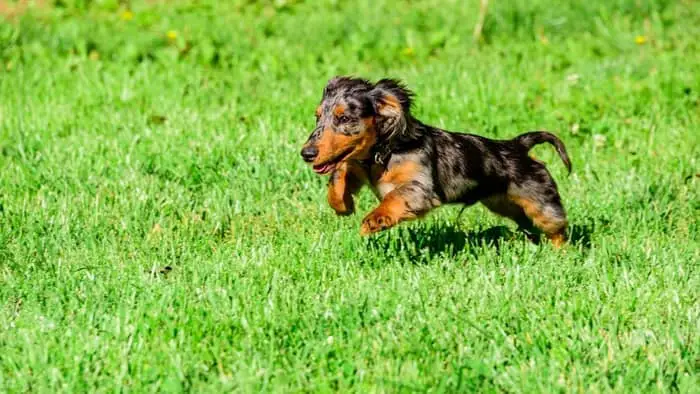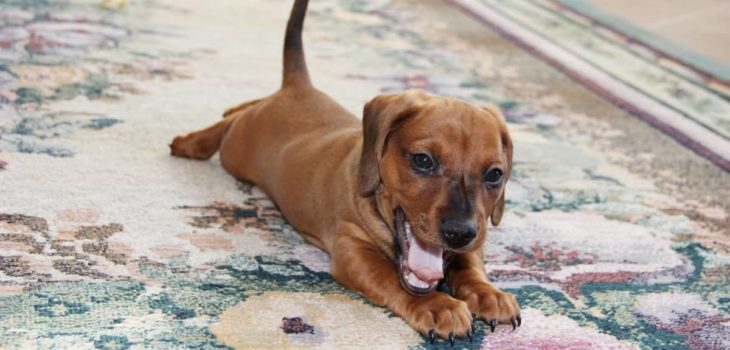Doxies can be a rowdy bunch so you might be wondering when do dachshund puppies calm down and become more manageable? So, let’s cover all the main aspects of dachshund behavior, playfulness, over-excitement, as well as anxiety, and other things you might want to know below.
When Do Dachshund Puppies Calm Down?
When do “puppies” calm down? Well – never, dachshund puppies are always overly-excited and playful. They will calm down a bit when they get older, i.e. when they start being puppies. However, keep in mind that even adult dachshunds are very playful and joyous dogs so they too can be a handful. And that’s a good thing – if your dachshund doesn’t love to play or commit the occasional mischief, then it’s probably unhappy or even depressed. Or, it’s a senior dog that’s “too old for this stuff”.
Dachsund Behavior By Age
Some folks aren’t really clear on when a pup transitions into an adult, and then into a senior. So, here’s a quick breakdown:
- 0 to 2 years – the hyperactive puppy and teen years
- 2 to 4 years – the early adulthood of calmer but still very playful dachshunds
- 4 to 6 years – the actual “middle age” where a dachshund is indeed more laid back
- 6+ years – these are the dachshund’s senior years – the oldest and calmest period of a Doxie which can last well over a decade with good care
All this isn’t to say that your 8 y.o. dachshund won’t be playful or that your 2 y.o. can’t be laid back and calm. Dogs are individuals, after all, and many don’t follow the expected breed-specific personality traits.
When Do Dachshund Puppies Calm Down Based On Their Sub-breed Or Coat Type?
There are three main types of dachshunds based on their coats – long-haired, wire-haired, and smooth or short-haired. The only difference between them is said to be the coat but it’s also probable that there are slightly different ancestor breeds used for each type.
Likely based on that, the long-haired dachshund is believed to be calmer and more laid back than wire- and smooth-haired dachshunds.
Do Doxies Calm Down After Neutering/Spaying?
The idea that dogs calm down after neutering/spaying seems to be somewhat of a bit of a myth. It does affect the dog’s hormonal balance but the research we have isn’t conclusive on how much that affects behavior. Many speculate that dogs calm down with age and not so much from the procedure itself. Of course, neutering/spaying does have many health benefits so it is strongly recommended.
Will Separation Anxiety Remain A Problem Even Once Your Dachshund Becomes An Adult?
Separation anxiety is a fact of life for dachshunds as it is for many other breeds. Such dachshund anxiety is to be expected pretty much every time you leave your dog home alone for extended periods of time. This is why such breeds aren’t recommended for people who work away from home and don’t have other family members to look after their pups.
If you want to avoid your dog’s separation anxiety you can do any or a few of the following:
- Look for a way to work from home
- Make sure other family members can cover for you
- Take your dog with you when you can
- Hire a dog walker or a dog sitter
- Arrange for play dates with other dog owners
- Give your dachshund plenty of exercise and playtime before you go out

- Get new interactive dog toys for your pup every couple of weeks
- Get a second dog to keep your dachshund company
If you can’t do any of those, you can very well expect your dachshund to start getting its frustration out on your furniture.
So, When Do Dachshund Puppies Calm Down and What Can You Do In The Meantime?
Like all other dogs and mammals, really, a dachshund will naturally calm down with age. However, this isn’t exactly a quick process. Dachshunds are a pretty playful breed and can be surprisingly energetic for their size. So, don’t be surprised if your dachshund continues to be overly excited even in its old age.
As for what you can do about it – just give your dachshund adequate training and socialization, and then plenty of exercise and playtime every day. This, together with good food and general care, will guarantee that your dog is always in great shape both physically and mentally. In case of actual fear or anxiety and not just excitement, you can calm your dachshund down with some love, a hug, and some pets.
FAQs
[rank_math_rich_snippet id=”s-ac0c7799-a2cd-4793-829e-d57bdb2a5be4″]




